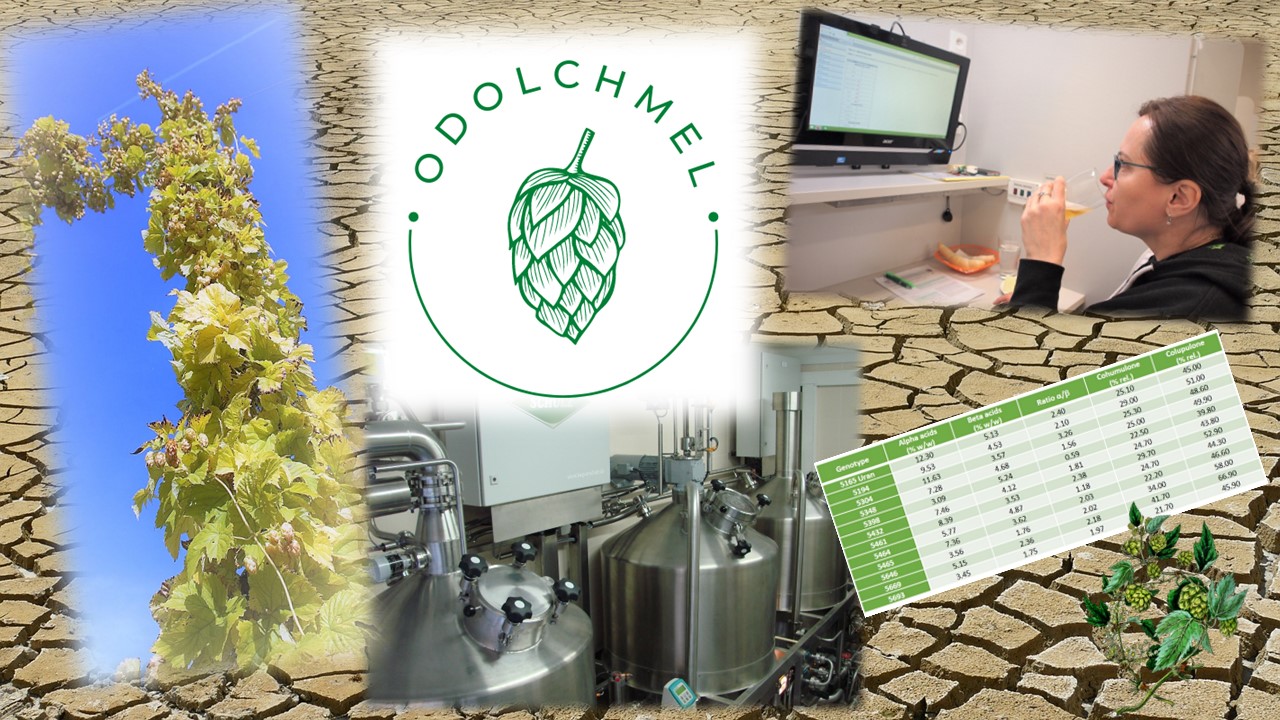Drought-tolerant hop genotypes – A promising solution to the problem of climate change for the hop industry?
DOI:
https://doi.org/10.18832/kp2023.69.777Keywords:
hop, breeding, aroma, new hop genotypes, draught-tolerant varieties, brewing testAbstract
Climate change can negatively influence hop yield and its quality. Cultivation areas limited by the prohibition of using water from small water sources are most at risk. In order to prevent these areas from completely disappearing in the future, planting hops with varieties or genotypes tolerant to drought could be a promising solution. Therefore, Czech hop breeding targets drought-tolerant genotypes with high crop yield and stability of quantitative and qualitative parameters which will also be well-usable in the Czech brewing industry. Twelve promising genotypes (5165 (Uran), 5194, 5304, 5348, 5398, 5432, 5461, 5464, 5465, 5646, 5669, and 5693) were selected after measurement of their physiological parameters and their basic chemical and sensorial properties were determined. Simultaneously, they were assessed from the point of view of brewing quality using sensory and chemical analysis using a brewing test. For this purpose, experimental beer using identical decoction single-hopped technology, where a hop aroma was highlighted using hopping in a whirlpool was prepared. The results show that three genotypes belong to the category of bitter varieties (5165, 5194, and 5304), whereas the other are genotypes exhibiting the character of aromatic varieties. From a grower’s point of view, genotypes 5165 (Uran), 5194, 5348, 5398, and 5461 show a very high yield. The overall impression of all beer samples is very good, bitterness is fine in most samples and hop aroma is mostly hoppy, herbal, woody, spicy, and in some cases also fruity (5304, 5461, 5465, 5646, and 5693).
References
Analytica-EBC, 9.4 – Original, Real and Apparent Extract and Original Gravity of Beer, 2004. https:// https://brewup.eu/ebc-analytica/beer/original-real-and-apparent-extract-and-original-gravity-of-beer/9.4
Analytica-EBC, 9.2.6 – Alcohol in Beer by Near Infrared Spectroscopy, 2018. https://brewup.eu/ebc-analytica/beer/alcohol-in-beer-by-near-infrared-spectroscopy/9.2.6
Analytica-EBC, 9.8 – Bitterness of Beer, 2020. https://brewup.eu/ebc-analytica/beer/bitterness-of-beer-im/9.8
Analytica-EBC, 9.6 – Colour of beer: Spectrophotometric Method, 2018. https://brewup.eu/ebc-analytica/beer/colour-of-beer-spectrophotometric-method-im/9.6
Analytica-EBC, 9.35 - pH of Beer, 2018. https://brewup.eu/ebc-analytica/beer/ph-of-beer-formerly-published-as-iob-method-9-42/9.35.
Analytica-EBC, 13.2 - Sensory Analysis: Tasting Area, Equipment, Conduct of Test – 2010. https://brewup.eu/ebc-analytica/sensory/sensory-analysis-flavour-terminology-and-reference-standards-465/13.12
Charvátová, J., Štefanová, L., & Nesvadba, V. (2017). Collection of hop genetic resources in the Czech Republic. Proceedings of the Scientific-Technical Commission, 25-29.
Irwin, A. J., Murray, C. R., & Thompson, D. J. (1985). An Investigation of the Relationships between Hopping Rate, Time of Boil, and Individual Alpha-Acid Utilization. Journal of the American Society of Brewing Chemists, 43(3), 145-152. https://doi.org/10.1094/ASBCJ-43-0145
ISO 8586:2015: ČSN EN ISO 8586 (560037) Senzorická analýza - Obecná směrnice pro výběr, výcvik a sledování činnosti vybraných posuzovatelů a odborných senzorických posuzovatelů
ISO 11132:2012 Sensory analysis — Methodology — Guidelines for monitoring the performance of a quantitative sensory panel
Jaskula, B., Kafarski, P., Aerts, G., & De Cooman, L. (2008). A Kinetic Study on the Isomerization of Hop α-Acids. Journal of agricultural and food chemistry, 56(15), 6408-6415. https://doi.org/10.1021/jf8004965
Mozny, M., Tolasz, R., Nekovar, J., Sparks, T., Trnka, M., & Zalud, Z. (2009). The impact of climate change on the yield and quality of Saaz hops in the Czech Republic. Agricultural and Forest Meteorology, 149(6), 913-919. https://doi.org/https://doi.org/10.1016/j.agrformet.2009.02.006
Nesvadba, V., Charvatova, J., & Stefanova, L. (2017). New Varieties and Perspective Genotypes of Hops. KVASNY PRUMYSL, 63(5), 237-240.
Nesvadba, V., Charvatova, J., & Stefanova, L. (2018).Utilization of hops genetic resources for hop breeding. Chmelařství, 91(4/5), 57-60.
Nesvadba, V,. Charvátová, J., Vostřel, J. & Werschallová, M. (2020) Evaluation of Czech hop cultivars since 2010 till 2019. Plant, Soil and Environment, 66,(12): 658–663.
Nesvadba, V., Olšovská, J., Straková, L. & Charvátová, J. (2021). Evaluation of Czech hop varieties. KVASNY PRUMYSL, 67(2), 428-434. https://doi.org/10.18832/kp2021.67.428.
Nesvadba, V., Olšovská, J., Straková, L., Charvátová, J., & Fritschová, G. (2022a). Evaluation of yield and alpha acid content in selected hop varieties. KVASNY PRUMYSL, 68(3+4), 637-641. https://doi.org/10.18832/kp2022.68.637
Nesvadba, V., Donner, P., & Charvátová, J. Hop breeding in the Czech Republic. In: F. WEIHRAUCH, ed. Proceedings of the Scientific-Technical Commission 03–07 July 2022, Lugo, Spain. Wolnzach: Scientific-Technical Commission of the International Hop Growers' Convention, 2022b, pp. 13–16. ISSN 2512-3785.
Ono, M., Kakudo, Y., Yamamoto, Y., Nagami, K., & Kumada, J. (1984). Quantitative Analysis of Hop Bittering Components and its Application to Hop Evaluation. Journal of the American Society of Brewing Chemists, 42(4), 167-172. https://doi.org/10.1094/ASBCJ-42-0167
Osvald, K. Kultura chmele po stránce šlechtitelské (Hops culture in terms of breeding). Český chmelař 1929, 9, 73–79 and 10, 84–86. (in Czech)
Osvald, K. Šlechtění chmele v Deštnici (Hop breeding in Destnice). Český chmelař 1931, 4, 28–29. (in Czech)
Rigby, FLA. (1972) Theory on the Hop Flavor of Beer. Proceedings of the Annual meeting - American Society of Brewing Chemists Chem 30:46–50.
Rigr A., Beránek F., Nesvadba V. (1997): Phenotype variability of the main characteristics of hop varieties as a source for hop hybridisation process. Rostlinná Výroba, 43: 315–318
Vent, L. Osvaldův odkaz (Oswald's legacy). Chmelařství – international edition 1999, 72, 13–15.
Protsenko, L., Ryzhuk, S., Liashenko, M., Shevchenko, O., Литвинчук, С., Yanse, L., & Milosta, H. (2020). Influence of alpha acids hop homologues of bitter and aromatic varieties on beer quality. Ukrainian Food Journal, 9, 425-436. https://doi.org/10.24263/2304-974X-2020-9-2-13
Rigby, F. L. (1972). A Theory on the Hop Flavor of Beer. Proceedings. Annual meeting - American Society of Brewing Chemists, 30(1), 46-50. https://doi.org/10.1080/00960845.1972.12005959

Downloads
Published
How to Cite
Issue
Section
License
Copyright (c) 2023 Jana Olšovská, Vladimír Nesvadba, Lenka Straková, Jaroslav Přikryl, Tomáš Vrzal, Pavel Donner, Radim Cerkal

This work is licensed under a Creative Commons Attribution 4.0 International License.







